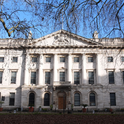In an episode of The Simpsons first aired in 1996, a stray bear is found roaming the town of Springfield. Angry residents swarm the mayor’s office demanding an end to a town “infested with bears.” “Please,” shrieks Helen Lovejoy, the pearl-clutching vicar’s wife, “won’t somebody please think of the children!”
The government’s latest legislation to clamp down on the prevalence of porn online bears the whiff of the same moral panic. The 9-month countdown has begun for the Digital Economy Act, a far-reaching piece of legislation aiming to introduce age checks on porn sites through credit card identification. Childnet, among others, have welcomed the move. The bill is to be overseen by a yet-to-be-appointed regulator who will diligently monitor pornographic sites and ensure they are playing by the rules. A truly selfless job.
Dubbed “one of the worst proposals I have seen on digital strategy” by Dr Joss Wright of the Oxford Internet Insitute, the bill is neither as straightforward nor as benign as it might seem. With hundreds of thousands of sites distributing the kind of material the government wants censored, the very feasibility of the bill is in doubt—not least because Twitter, Tumblr, and other social media sites won’t be covered.
Privacy questions also loom large. The Ashley Madison hack of 2015 saw the names of thousands of people seeking to have extra-marital affairs leaked to the public. The recent spate of ransomware attacks across the world should give pause before we sign away our browsing histories to those glimmering bastions of ethical practice, the credit card authorities.
But ultimately, the debate is being waged in the name of children, and it’s on their behalf that this bill should be shelved. Porn isn’t just for pleasure: it’s pedagogic, too.
Sex and Relationships Education (SRE) remains woefully inadequate across the UK: only in March 2017 did it become mandatory for all schools, not solely those under the aegis of local authorities. But mandatory sex education doesn’t mean good sex education. Watching a fifty-seven-year-old corduroy-clad geography teacher coax a johnny onto a wilting banana might tick a box, but it doesn’t provide the guidance which young people desperately need.
Educational failings hit the most vulnerable pupils the hardest: LGBT kids, as ever, get the short end of the stick. A report by Cambridge University published earlier this year noted that 40 per cent of pupils in the UK receive no LGBT-specific sex education at all. These problems don’t stop at the school gate: in a world where HIV transmission rates remain stubbornly high and transgender women are customarily beaten and even murdered, often by male sexual partners, sex education can turn out to be a matter of life and death for queer adolescents.
Queer kids are rarely in a position to ask the questions they need answered, however: the same Cambridge University report found that 45 per cent of LGBT pupils are bullied, while a study by Metro Youth Chance in 2014 found that 28 per cent of transgender young people are physically assaulted at school. In that context, would you feel comfortable asking about the intricacies of douching or anal sex? Would you find the strength to discuss the ins-and-outs of trans sex in front of your classmates when you risk getting your head kicked in?
Higher rates of drug abuse, mental illness and suicide also plague LGBT people throughout their lives. Perhaps resolutely failing to teach them how to have sex free of shame and stigma should shoulder part of the blame.
Meanwhile, porn steps in where schools step out. When you can’t ask Mr Smith in the Maths department about safe sex as a lesbian or trans kid, you go online.
Porn’s role as an educator should indeed be cause for concern: erectile dysfunction, body dysmorphia and the surging demand for labioplasty among underage women and girls have all been tied to the kinds of unattainable bodies and fantasies that the porn industry relies on. Leaving education up to an industry that often, if not always, fetishizes people of colour into exotic stereotypes for a white gaze, or presents women as mute canvasses for male desire, is irresponsible. But removing the only education available isn't the answer.
The most effective bulwark against porn’s failings, lies not in legislation, but better education. Kids don’t need the iron fist of the censor, but the guiding hand of the educator. If porn can be linked to a litany of social and sexual ills, it’s because naive eyes mistake fantasy for reality, not because fantasy itself constitutes harm.
So perhaps we should “think of the children”: not some puritanical and illusory vision of what childhood should be, but the messy, experimental and virtual realities that teens actually live.
Kids deserve more than paternalistic legislation that blocks them from seeking answers to questions they’re shamed out of asking. They deserve education.
Porn minimum age laws could harm, not help, vulnerable kids
Pornography can present a distorted view of sex. But for some kids, it's still the best sex education available
July 19, 2017

We shouldn't be leaving sex ed to the porn industry: but the answer is education, not legislation. Photo: Pixabay











